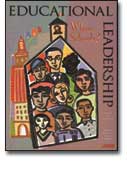It's baby-kissing season again," noted an ASCD colleague recently about the upcoming elections. This year, given the significance of education issues in the pre-election polls, savvy candidates will be kissing more babies—and paying more attention to the educational needs of young people—than usual. One month before the school year even began, participants in an Associated Press survey on political attitudes and the House elections indicated that education was their number-one concern.
From congressional contests to local school board races, questions about school finance, teacher quality, and achievement standards loom large this year. And although candidates of all stripes have been quick to tap into the electorate's concerns, the markedly different ways in which they are framing the education picture have much to say about the public's perceptions of public schools.
Accountability and Choice
The campaign themes of school accountability and choice are echoing around the country. Democrats and Republicans alike have embraced public charter schools, although emerging research casts some doubt on the benefits of charters.
Educators nationwide should keep a careful eye on Florida, where Republican gubernatorial candidate Jeb Bush and running mate Frank Brogan, the Sunshine State's chief school officer, have made a proposal to "grade" schools by using standardized test scores a campaign centerpiece. High-achieving schools would receive performance bonuses, whereas parents of students in Florida schools that drop two letter grades or earn an F two years in a row would be given vouchers to send their children elsewhere.
This proposed marriage of accountability to a free-market style of schooling is hardly new to election rhetoric—yet the seriousness with which voters are considering this proposal at the state level is. As is the case with all voucher measures, the critical question is whether such a platform would in effect become an educational gangplank, particularly for students living in poverty.
Meanwhile, California voters will consider Proposition 8. Republican Gov. Pete Wilson's broad education reform package establishes an inspector for public schools, requires teachers to pass subject-matter examinations, and makes the state's current class-size reduction efforts permanent. With class-size reduction proposals on the horizon in other states, the outcome of the Proposition 8 vote merits attention well beyond California.
Class-size reduction is a key platform item for Iowa's Democratic gubernatorial candidate, Tom Vilsack, for example. Iowa voters will determine whether Vilsack or Republican candidate Jim Ross Lightfoot will succeed retiring Gov. Terry A. Brandstad, who made teacher testing and certification a final-term focus.
Informing the Vote
If, as Adam Kernan-Schloss and Andy Plattner indicate (p. 18), educators themselves are a primary source of information about local education issues, then now is a critical time to talk with community members about recent education research and the view from inside our schools. Three-quarters of U.S. households do not have school-age children, so such conversations may just be a deciding factor between pulling one lever or the next in our voting booths.
